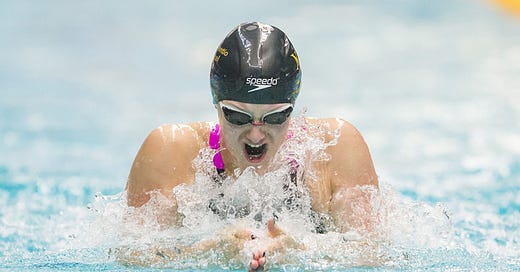Every fourth summer, Americans put aside our differences to unite in a favorite pastime: making fun of racewalking. As foreign competitors take goofy strides, follow obscure rules, and do a slow thing as fast as they can, we point and laugh: why does the Olympics give out medals for doing that?
And then we turn on NBC in prime time and root for Americans in the backstroke, butterfly, or breaststroke—which are every bit as dumb.
You can technically swim however you want in the freestyle, but everyone uses the front crawl, because other strokes are much slower. In the breaststroke, for instance, the gold medalist in Tokyo swam 100 meters in 57.4 seconds. In the freestyle, that’s about the same as the US record for 10-year-olds.1
And while the backstroke is at least a natural way for humans to swim, the butterfly and breaststroke are not. These disciplines have strict rules about what makes the stroke legal, because swimming in a different (faster) way would be cheating. Olympic swimmers are good enough that you can forget about how weird these motions are, but go watch a swim meet for eight-year-olds—half of them get DQ’d in every race. We shouldn't put up with this any more than we put up with racewalking.
Of course, simply getting rid of the other three events would be a non-starter: NBC would lose that sweet prime-time swimming inventory, and America would lose medals from events we do well in. But don’t fret! Borrowing from track and field, we can invent new competitions that showcase swimming in better ways:
Underwater hurdles: Set up buoys every 10 meters, so swimmers have to dive under them and resurface after each one.
Inverted steeplechase: There's only one buoy in the pool, but it’s really deep, and there’s also a land bridge halfway through that swimmers have to flop over.
Aquatic decathlon: The same people compete in several different lengths of freestyle races, diving competitions off the springboard and platform, and maybe even a game of water polo while we're at it.
All of these events would also be a little bit weird; like on the track, they wouldn’t be as popular as the pure sprints. But at least they’d reward whoever can swim through the course the fastest, not who can do it in an artificially slower way.
This accounts for the fact that 10-year-old Americans swim in yards, not meters.




I like the necessity of form in the mix. Correct form enters into many of the Olympic sports and I love the ballet of it all.
I really enjoy your newsletters. Thank you for sending!